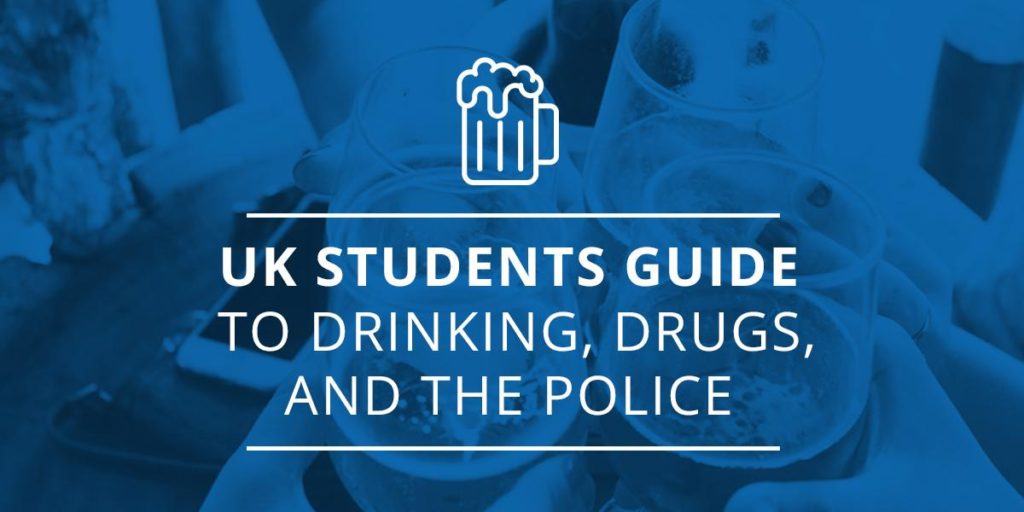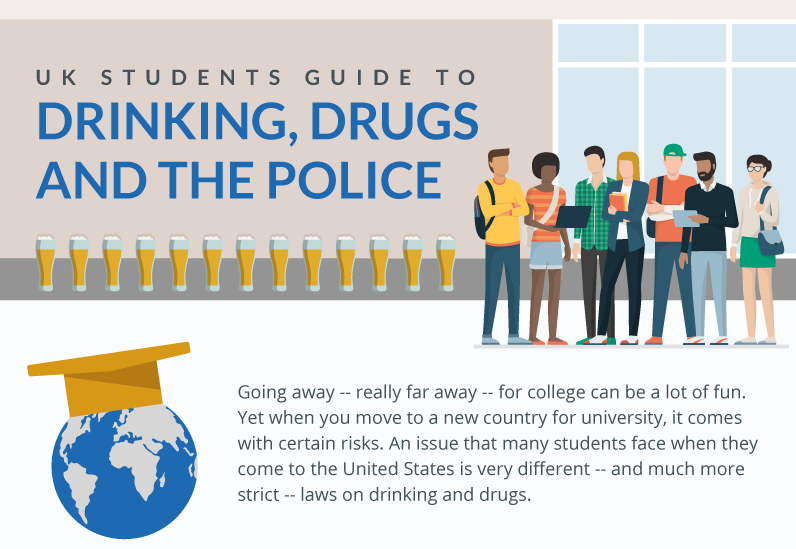
Going away for college can be a lot of fun. For what is likely the first time, you will have the freedom to do what you want, from going out with friends to sleeping in late to partying. Yet this freedom comes with certain risks, particularly when it comes to drinking and drugs.
Most UK students are already aware that the legal drinking age in Kentucky is 21, and that certain drugs (including marijuana) are illegal. Yet you may not fully grasp just how serious an alcohol or drug related arrest can be, or what your rights are when partying.
Understanding these laws is the first step to take in protecting yourself from arrest. Below, we outline Kentucky’s on drinking and drugging — and explain what your rights are if you encounter the police while engaging in either activity.
Check out our UK Students Guide to Drinking, Drugs, and the Police infographic!
Kentucky Laws on Underage Drinking
In the commonwealth of Kentucky, the legal age to drink alcohol is 21. Anyone under the age of 21 is considered a minor for purposes of Kentucky’s alcohol laws. Even if you are legally able to drink in the U.K., it is still illegal for you to do so in Kentucky.
First, it is illegal for minors (a person under the age of 21) to possess, purchase, or attempt to purchase alcohol — or to ask a person over the age of 21 to purchase an alcoholic beverage for you. This law also forbids:
- Entering an establishment that sells alcohol for the purpose of buying alcohol;
- Helping a person under 21 buy alcohol;
- Lying about your age to purchase alcohol; or
- Using a fake ID to buy alcohol.
If you are under the age of 18 and are apprehended by the police for being a minor in possession, you will be charged as a juvenile. However, if you are 18 or older, then the first offense is a violation, punishable by up to 90 days in jail and/or a fine of up to $250. Any additional offense will be charged as a Class A misdemeanor, with a potential sentence of a maximum of 1 year in jail and/or a fine of up to $500.
Second, it is against the law for a minor to operate a motor vehicle with a blood alcohol content (BAC) of .02% or higher. This is substantially lower than the legal limit for adults, which is .08% BAC. It is known as Kentucky’s “zero tolerance” law.
If you are charged with driving under the influence (DUI) as a minor, then you could face significant penalties, including a driver’s license suspension of 30 days to 6 months, a fine of up to $500, and 20 hours of community service.
Third, you could be charged with public intoxication if you appear in public under the influence of alcohol and/or drugs to the extent that you are a danger to yourself, to others, or to property, or that you may “unreasonably annoy” others around you. Drinking alcohol in a public place is also illegal in Kentucky.
Keep in mind that even if you are 21 or older, you could still be charged with an alcohol-related offense as a college student in Kentucky. This may include DUI, public intoxication, and drinking alcohol in a public place.
Kentucky Drug Laws
The possession, purchase, and sale of many types of drugs is illegal in Kentucky. If you are caught with any of these drugs — referred to as controlled dangerous substances (CDS) — you could be facing serious criminal charges. CDS includes everything from PCP to cocaine heroin to GHB to marijuana. You can also be charged with an offense if you possess a prescription medication, such as oxycodone, without a valid prescription.
Kentucky classifies drugs based on a schedule, from most dangerous (Schedule I) to least (Schedule V). A drug’s classification will determine the degree and penalty of a possession charge. For example, you may be charged with possession of a controlled substance in the first degree — a Class D felony — if you are arrested with methamphetamine, a Schedule I drug.
Selling these drugs is also a criminal offense, with the penalties based on the type and quantity of drug sold. For example, trafficking 20 or more dosage units of a Schedule IV or V drug, like Xanax or Ativan, may be charged with trafficking in a controlled substance in the third degree. This charge may be a (Class A misdemeanor 120 units or less) or up to a Class D felony for more than 120 units or for a repeat offense.
Although many states in the U.S. have legalized the sale and possession of both recreational and medical marijuana, it remains illegal in Kentucky, and under federal law. In Kentucky, marijuana is classified as a Schedule I drug, which means that charges related to marijuana may result in serious penalties. This includes sale, possession, and cultivation offenses.
In addition to drug possession and trafficking charges, you can also be charged with driving under the influence (DUI) if you operate a motor vehicle while impaired by medication or drugs. Under these laws, if any medication — even a prescription or over-the-counter medicine — impairs your ability to drive, you could be charged with a DUI.
Student Arrests in Kentucky By the Numbers
As described above, Kentucky’s drug and alcohol laws are strict. Yet college is the first time that many young adults are away from home, making their own decisions and looking to have fun (while they get their education). It isn’t surprising, then, that so many Kentucky college students find themselves in trouble with the law.
According to Kentucky Alcohol Prevention, 5% of all college students in the state are involved with police or campus police as a result of their drinking. Each year, 110,000 students are arrested for alcohol-related violations.
Drug and alcohol offenses are incredibly common on many college campuses. For example, the University of Kentucky’s crime report shows that in 2019:
- 79 students were arrested for DUI
- 97 students were arrested for public intoxication
- 9 students were arrested for being a minor in possession of alcohol
- 224 students were arrested for drug offenses
At the University of Louisville, the numbers were similar, although many incidents resulted in disciplinary referrals instead of arrests. In 2018:
- 3 students were arrested for drug offenses
- 17 students were arrested for liquor law violations
- 53 students received disciplinary referrals for drug offenses
- 82 students received disciplinary referrals for liquor law violations
Another large public university, Western Kentucky University, reported that in 2019:
- 22 students were arrested or cited for liquor law violations
- 97 students were arrested or cited for drug offenses
- 1 student received disciplinary referrals for a drug offense
- 0 students received disciplinary referrals for liquor law violation
Of course, these statistics only represent incidents reported to the university police — not those handled by state or local police. In addition, these numbers don’t take into account many offenses, like criminal mischief, that may be related to drugs or alcohol. However, these reports do raise an important point: if you are caught with drugs or alcohol while a university student, you could face disciplinary action from your school in addition to or instead of being arrested or charged with a crime.
In 2018, the Kentucky State Police arrested 596 college students for drug crimes. This number represents an increase from the 533 students arrested on similar charges in 2016.
Out of 80,473 total arrests for drug offenses in Kentucky in 2019, 22,332 were committed by people between the ages of 18 and 19 (2,317) and 20 to 29 (20,015). That same year:
- 727 18- 19-year-olds were arrested for driving under the influence (DUI)
- 5,950 20- 29-year-olds were arrested for DUI
- 534 18- 19-year-olds were arrested for public intoxication
- 4,867 20 – 29-year-olds were arrested for public intoxication
- 65 18- 19-year-olds were arrested for liquor law violations
- 37 20- 29-year-olds were arrested for liquor law violations
The Kentucky State Police do not break down these numbers by college students versus other young adults. However, it is a safe bet that a significant chunk of these arrests was of young people attending colleges and universities throughout the commonwealth.
Your Rights When Interacting with the Police
If you are attending college in Kentucky, it is important to know your rights if the police become involved in an incident involving drugs or alcohol. Some of these rights will depend on where you are and what is happening at the time of your interaction with the police.
If you are stopped by the police while you are intoxicated, you have the right to remain silent. You don’t have to answer any questions about where you are going or where you have been. You are not even required to identify yourself, although failing to do so may give the police reason to think that you have done something wrong.
The police may conduct a pat-down search of your clothing if they suspect that you are carrying a weapon. This pat-down is for officer safety, and can’t be a search for drugs. You do not have to consent to a search of yourself or your belongings.
If you are arrested, you have the right to an attorney. The government may appoint one for you if you cannot afford one. Ask for an attorney, and tell law enforcement that you are exercising your right to remain silent.
The same rights apply if you are pulled over by the police. Passengers in a vehicle also have a right to remain silent.
If the police show up at your home, you do not have to let them in or consent to a search. If they have a warrant, ask them to show it to you so that you can review it. Even if the officers have a warrant, you can still exercise your right to remain silent.
These are some of the most basic, fundamental rights afforded under the United States Constitution: the right to remain silent, the right to an attorney, and the right to be free from unreasonable searches and seizures. Keeping them in mind can be incredibly helpful if law enforcement approaches you after you have been drinking or using drugs.
Arrested for a Drug or Alcohol Offense? We Can Help.
Being charged with any type of crime as a university student can seriously affect your future. Certain types of convictions can even impact your ability to continue your education if you rely on student loans. If you are arrested on a drug, alcohol, or any other charge, we are here for you.
At Baldani Law, we represent clients throughout Kentucky who have been charged with a range of crimes. For each individual, we use our substantial experience to aggressively advocate for the best possible outcome to the charges against them. To learn more or to schedule a consultation with a Lexington criminal defense attorney, contact us today at 866-867-1036, or fill out our online contact form.
